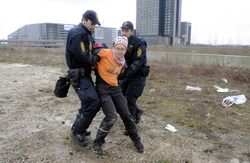Danish police accused of brutality at climate summit
Tom Whipple
Richard George did not commit a crime. Nor was he suspected of doing so.
He knows this because the Danish police told him so. They told him as they cable-tied his hands behind his back and sat him down in the snow for an hour; they told him as they moved him to a warehouse full of cages on the edge of Copenhagen. And they told him as they pepper-sprayed him in the cages.
They were equally clear about the innocence of his friends — the 18 year-old woman who was put in hospital by a police dog, and the other British environmental activists who joined him this week in a temporary jail that the police refer to as Guantánamo Junior. All five were stopped while cycling to a protest outside the UN summit.

Initially they were told that they were going to be searched, but then the police orders changed. “The officer said, ‘I’m afraid we’re going to have to arrest you. You’re not criminals, we’re not going to treat you like criminals, but we’re going to arrest you’,” Mr George told The Times. “He was very apologetic.”
More than 1,000 people were arrested last week under a Danish law brought in for the UN summit. It gives police powers preventively to detain people that they believe might commit a crime, even if they are innocent at the time.
It was an hour until a coach arrived to take the prisoners from the side of the road to the temporary jail built for the climate summit.“ They made us sit on benches,” Mr George said. “But by now we were so angry. The room of 40-50 people stood up. As soon as the police pushed one person down, another person would rise.”
Patrick Gillett, 25, claims that they reacted violently to him. “They dragged me across the benches by my neck, and stood on my chest. Then they chucked me against the wall and kicked me, before going back inside.”
His friend, Oscar Cooper, 19, also said that he was manhandled. “Three officers tripped me forwards and had me on my knees — and every time I lifted my head they would smack it on the floor,” he said. “Then this Italian man just started screaming, ‘My shoulder, my shoulder, my shoulder — get off me’. I’ve never seen a grown man cry like that. They placed him in front of me, and I could feel his shoulder. It was completely out of the socket. I shouted, ‘Get him a medic, get him a medic’. It was harrowing to see them do nothing.”
Next door, Aimée Lormand could hear the shouting, but didn’t know what was going on. When her friends were arrested, she had hidden in the trees, until she was found by a police dog. “It was off the leash, and just tearing at me,” Ms Lormand said. “There were no police anywhere near it.”
She was taken to jail but because of her injuries was processed separately and sent to hospital. “The doctor said these were the worst bites she had seen that week. She said, ‘You can sue the police for this. The dogs should never be off the lead, and should never be that aggressive’. Then I was driven in a police car to a station in the middle of nowhere and just left — on my own, with no money.”
In the jail, hundreds of protesters were transferred to cages, where police intended to keep them until it was time for their release. “We were shouting, ‘Let us go, let us go’,” Mr George said. “We were in these hamster cages, but we weren’t animals. And we weren’t criminals.”
He realised that the partition walls could be removed by force. They started joining the cells together.
“The police responded, bringing in a whole squadron of riot police and blasting us with pepper spray. I got a nasty dose in my eye, and then collapsed on the floor,” Mr George said.
“A German beside me shouted, ‘Why are you doing this? Why are you doing this?’ And the police officer said, ‘I’m just following orders’. And he screamed, ‘My grandfather said that. My grandfather was only following orders and six million people died. I am from Germany, and you are a fascist’. He was almost crying with anger.”
By the time the authorities were legally obliged to release them — without charge — the air was so thick with pepper spray that even the police were coughing.
Some in Denmark are worried that the policy of pre-emptive arrests will remain after the climate summit. “You get to go home now,” one Danish protester told The Times. “But we have this law for the rest of our lives.”
Source: http://www.timesonline.co.uk/tol/news/environment/article6961773.ece



